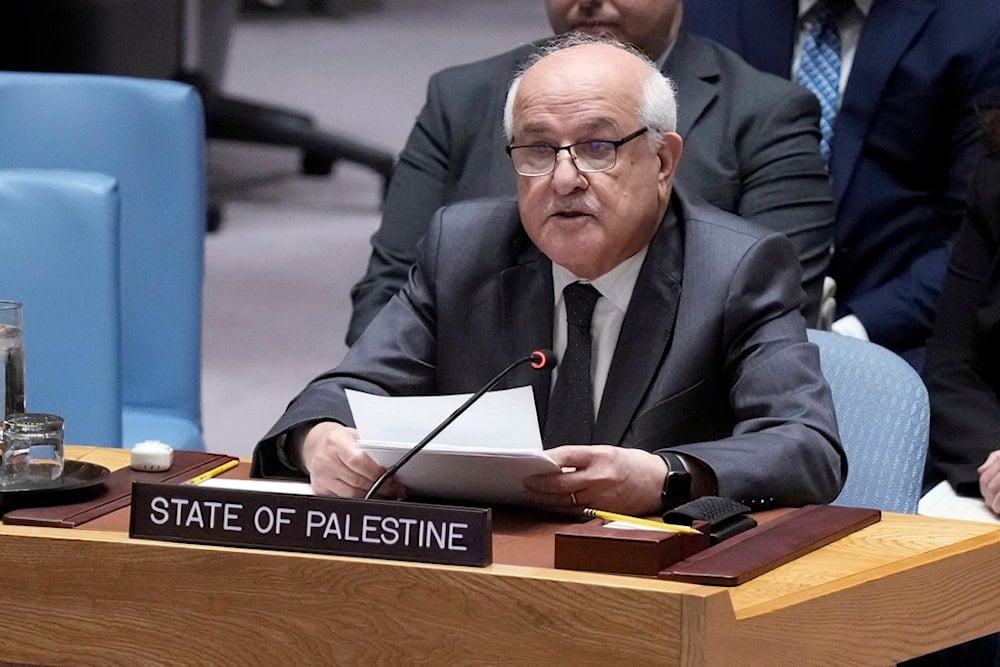Palestine rejects recognition-for-normalization scheme at UN
Palestine’s UN envoy slams efforts to tie statehood recognition to normalization with the Israeli occupation, warning such moves betray Palestinian rights and the Arab Peace Initiative.
-

Palestinian Ambassador to the United Nations Riyad Mansour addresses the United Nations Security Council, Friday, March 21, 2025. (AP/Richard Drew)
Palestine's Permanent Representative to the United Nations, Riyad Mansour, strongly denounced ongoing attempts to condition international recognition of the State of Palestine on normalization with the Israeli occupation.
He asserted that such efforts are a clear betrayal of the Arab Peace Initiative, which unequivocally calls for the full establishment of a sovereign Palestinian state, based on the 1967 borders with the eastern part of al-Quds as its capital, before any normalization can be considered.
Addressing the press during UN Security Council consultations, Mansour demanded urgent international action to halt the Israeli regime's brutal war on Gaza. He called for an immediate ceasefire and the enforcement of international agreements to uphold the Palestinian people's fundamental rights to peace, dignity, and security.
Mansour warned that some governments are seeking to instrumentalize Palestinian statehood as leverage to accelerate their normalization agendas with the occupation, an approach the Palestinian leadership categorically rejects.
"Peace must be built on justice and the full recognition of Palestinian rights, not at their expense," he said.
Blocked peace
His remarks come at a time of mounting Arab and international outrage over Tel Aviv's continued aggression and rejection of global diplomatic efforts. Saudi Arabia, a key regional player, has reiterated its longstanding refusal to normalize ties with "Israel" in the absence of a just resolution to the Palestinian issue. In early June, Riyadh condemned "Israel" for blocking an Arab ministerial visit to Ramallah, labeling the move an act of "extremism and rejection of peace."
Recent developments underscore the concerns raised by Mansour. Countries such as Indonesia have expressed willingness to normalize ties with "Israel," but only on the condition that a Palestinian state is formally recognized. President Prabowo Subianto made clear that freedom for Palestine and the two-state solution are prerequisites for peace.
Meanwhile, France has floated a vision of recognition as part of a broader regional settlement, suggesting a model where normalization and Palestinian statehood proceed in tandem, raising alarm among Palestinians who fear their rights may be used as diplomatic currency.
Justice denied
Mansour urged the Security Council to fulfill its legal and moral obligations by passing a resolution to immediately stop the genocidal aggression in Gaza and hold the occupation accountable.
He further called on the international community to end the double standards that shield "Israel" from consequences, and to finally implement longstanding resolutions that affirm the Palestinian people's right to freedom, sovereignty, and protection under international law.
While support for Palestinian statehood is growing, with 143 nations recently backing a UN General Assembly resolution to expand Palestine's rights at the UN, the United States continues to block full membership by abusing its veto power.
Read more: Will Trump recognize a Palestinian State? - The Media Line

 3 Min Read
3 Min Read








